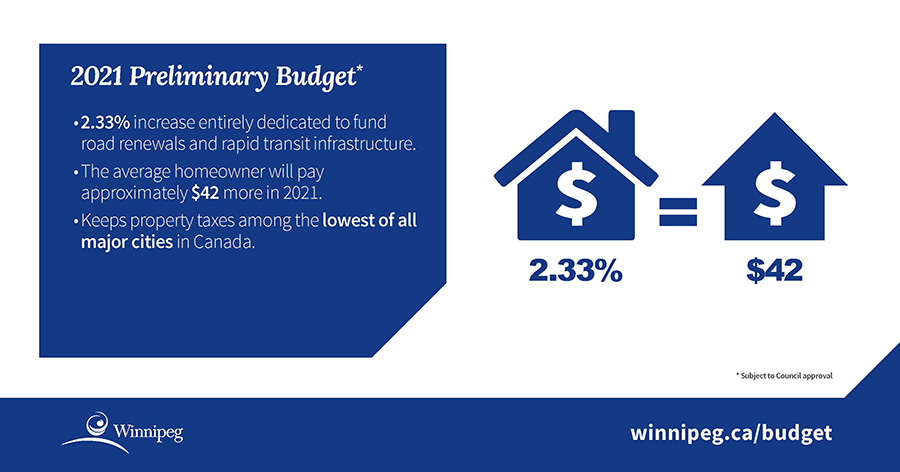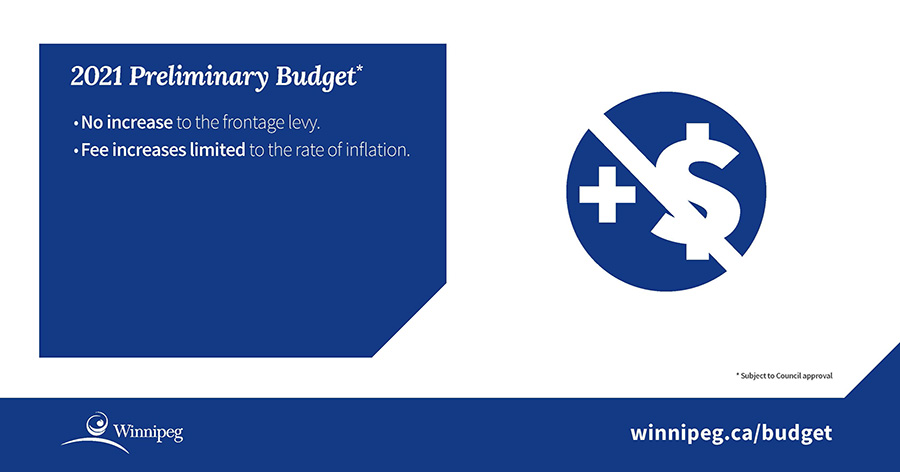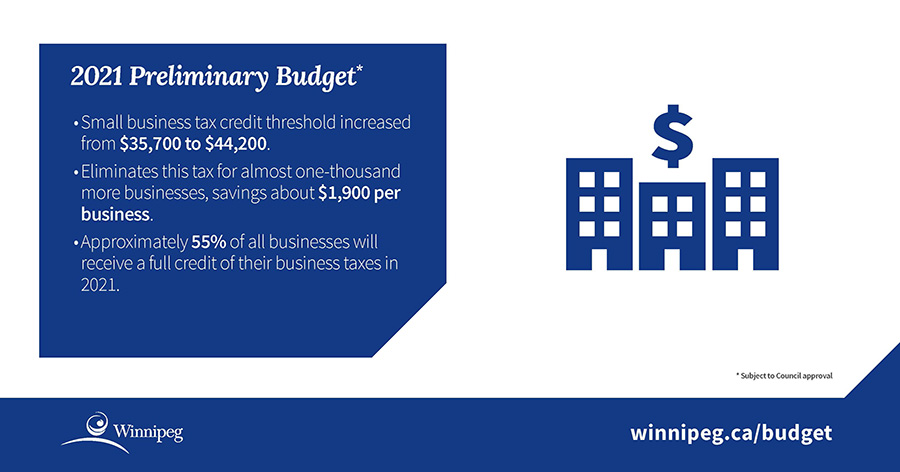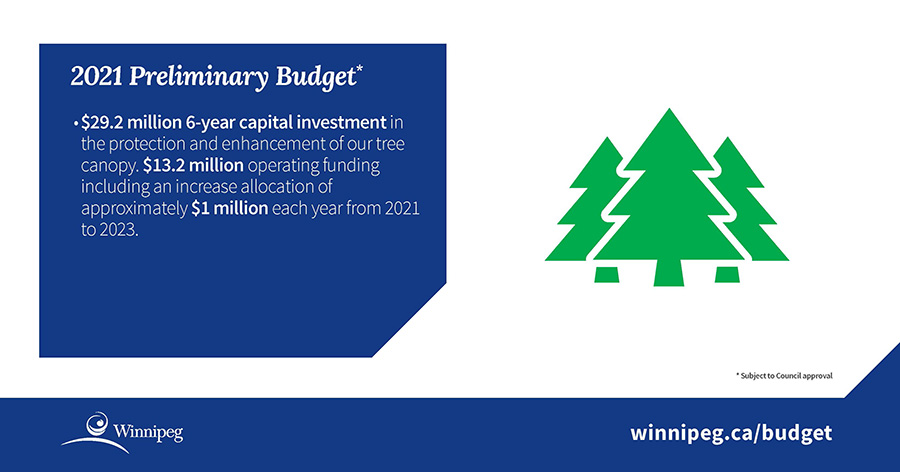Multi-year budget: 2021 update
Introduction
We are pleased to table the Preliminary 2021 Balanced Budget Update to the 2020-2023 multi-year balanced budget.
On March 20, 2020, Winnipeg City Council adopted a historic four-year balanced budget for 2020-2023. Shortly thereafter, we faced the onset of the COVID-19 pandemic. Schools, local businesses, and many City facilities were immediately closed as a result of Provincial public health orders to halt the spread of the virus. While there was a brief reprieve over the summer months, and an opportunity to open many of our City services up to the public again, a second wave of COVID-19 resulted in the closure of many of these facilities and changes to our services for a second time.
The COVID-19 pandemic continues to take a toll on many aspects of our lives. Immediately after the onset of the pandemic, Winnipeg City Council adopted a COVID-19 Crisis Cash Flow Management Plan to address the negative financial impacts of the pandemic, with the multi-year balanced budgets being the foundation of this plan. We continue to monitor and refine this plan, while simultaneously focusing on the future by presenting the Preliminary 2021 Balanced Budget Update today.
Last year’s multi-year budget was open to an unprecedented level of public feedback throughout the entire process that took several months. This year’s Preliminary 2021 Balanced Budget Update reflects feedback we received this year including data collected through the annual citizen satisfaction survey, and information collected during a recent online survey seeking feedback from residents on how the COVID-19 pandemic has changed their views on the City’s budget priorities.
The Preliminary 2021 Balanced Budget Update also reflects feedback received by the Chair of Finance from every member of Council. Today’s tabling of the Preliminary 2021 Balanced Budget Update continues the open and transparent budget review process.
The Preliminary 2021 Balanced Budget Update presents a balanced budget for 2021 and five-year capital forecast which is required under The City of Winnipeg Charter. The Preliminary 2021 Balanced Budget Update also presents balanced budgets for the next 2 years, while continuing to implement the measures approved by Council last year within the multi-year balanced budgets. We continue to balance the budgets despite the economic uncertainty associated with the pandemic, frozen operating funding support from the Province of Manitoba, and capping annual property tax increases at 2.33 percent, which are dedicated to capital investment in road renewal and the Southwest Rapid Transitway.
Operating Revenues, Expenses and the Financial Stabilization Reserve
At the start of the Preliminary 2021 Balanced Budget Update, we were facing a shortfall of $56 million in transit and tax supported departments related to the COVID-19 pandemic, which has since been reduced to $55.4 million. This recent projection assumes that the impact of the pandemic on the City’s finances will be limited to 2021. Should the impacts of the COVID-19 pandemic continue beyond 2021, the financial impact to the City may be considered in future budget updates. The shortfall of $55.4 million for 2021 includes:
- $14 million in the tax-supported budget mostly from lower projected permit revenue, lower facility use, and increased costs for personal protective equipment and sanitizing supplies, and;
- $41.4 million from Winnipeg Transit, primarily from lower projected ridership levels.
The Preliminary 2021 Balanced Budget Update will partially offset the pandemic related operating shortfall in transit of $41.4 million with $12.9 million of savings within Transit. These savings include:
- maintaining the six percent reduction in bus operating hours throughout 2021, which was done in response to the cancellation of in person classes at post-secondary institutions;
- reducing the number of bus purchases from 30 to 25;
- deferring other capital purchases, and;
- replacing cash to capital with debt.
This results in a net Transit shortfall of $28.5 million that must be supported by Winnipeg property taxpayers in 2021, barring a decision by the Province of Manitoba to match the federal Safe Restart funding for public transit, as other provinces have done.
In a further effort to re-imagine efficient service delivery, Winnipeg Transit will collaborate with the Innovation, Transformation & Technology Department on a targeted pilot to quickly assess the savings opportunities with On-Request Transit service as contemplated in the Draft Winnipeg Transit Master Plan (WTMP). With close to half of the City’s total 2021 operating budget pressures associated with Winnipeg Transit, any opportunities to maintain service and improve efficiency must be prioritized. On-Request service has been proposed as an area of focus in the WTMP, and while a final version of the WTMP is forthcoming for Council approval in 2021, the potential benefit from the technology is too great to delay this pilot which will include an immediate $140,000 technology investment in the Dart Service and a report back in 2021.
There are also $10.4 million of other unbudgeted costs over the next three years directly related to the provincial government’s decision to reverse its announced PST reduction, additional costs for provincially mandated paramedic licensing requirements, and an additional investment in trees to address the significant damage to Winnipeg’s tree canopy from the October 2019 storm. There is also a further $30.7 million shortfall in the multi-year budgets related to an arbitrator’s decision to reverse Council approved changes to the police pension plan.
In summary, the total tax-supported budget shortfall to be addressed in the Preliminary 2021 Balanced Budget Update is $83.6 million over the next three years.
| Net Transit shortfall due to COVID-19 | $28.5 million |
| Other costs due to COVID-19 | $14.0 million |
| Additional costs | $10.4 million |
| Winnipeg Police Pension Plan shortfall | $30.7 million |
| Total tax-supported budget shortfall: | $83.6 million |
The Preliminary 2021 Balanced Budget Update includes the following measures to fully offset the $83.6 million budget shortfall noted above, and keep the 2021-2023 tax-supported budgets in balance:
| Leverage provincial capital commitment to invest in City capital projects | $30 million |
| Replace cash to capital with external debt | $10 million |
| Savings from a recently negotiated collective agreement with the Winnipeg Association of Public Service Officers (WAPSO) | $12 million |
| Adjustment to the estimated amounts for future labor settlements | $16.3 million |
| Projected savings in the Winnipeg Police Service budget to be determined by the Winnipeg Police Service | $15.3 million |
| Total offset: | $83.6 million |
The Preliminary 2021 Balanced Budget Update continues to cap property tax increases at 2.33 percent per year for the next three years with the entire increase dedicated to Winnipeg’s infrastructure requirements. This means the average homeowner will pay an additional $42.34 in property taxes in 2021. Winnipeg will continue to have among the lowest property taxes in Canada.
The Preliminary 2021 Balanced Budget Update proposes a significant increase to the Small Business Tax Credit threshold from the current level of $35,700 to $44,200, which will result in almost 1,000 more Winnipeg businesses saving an average of $1,926.12 by becoming fully exempt from paying this tax in 2021. It will also result in almost 55 percent of all Winnipeg businesses being fully exempt from paying the business tax. The current business tax rate will remain frozen at 4.84 percent and business tax revenue will remain the same in 2021 as in 2020.
The Preliminary 2021 Balanced Budget update includes Winnipeg’s funding allocation under the federal government’s Safe Restart Agreement. Winnipeg will receive approximately $74.5 million under this Agreement including $42.2 million for COVID-19 operating costs and $32.3 million for public transit. All of the public transit funding will be used to offset the transit operating losses in 2020 as a result of reduced ridership from the COVID-19 pandemic.
Approximately $31.3 million of the federal funds available through the Safe Restart Agreement will be used to balance the tax-supported operating budget in 2020 by reversing some of the cash flow levers contained within the Council approved COVID-19 Crisis Cash Flow Management strategy, and replace lost parking revenue as a result of the pandemic. These measures will reset the Financial Stabilization Reserve (FSR) to protect the City in 2021 from the negative financial implications of the pandemic. A further $7.6 million of funds from the federal Safe Restart Agreement will be used to support measures to ease the burden of the pandemic on residents and business in 2021, with the remaining $3.3 million supporting a COVID-19 economic restart plan.
The FSR will continue to serve as the City’s financial backstop to address the financial uncertainty associated with the COVID-19 pandemic. Council has mandated that the FSR contain at least six percent tax supported expenditures. It is expected that the balance in the FSR will meet and exceed this minimum level for the next three years which will give the City the financial flexibility to respond to uncertainties associated with the COVID-19 pandemic.
Overall, the tax-supported operating budget increases by an average of 2.1 percent annually over 2020 to 2023, consistent with the growth rate projected for these years in the multi-year budgets (2.6 percent).
Addressing the Challenges of the COVID-19 Pandemic
The Preliminary 2021 Balanced Budget Update addresses the challenges of the COVID-19 pandemic with investments in three main areas:
1. Keeping People Safe – approximately $4.0 million investment from General City Revenues including:
- Purchase of Personal Protective Equipment for our front-line workers as well as additional cleaning, sanitizing, and related supplies in Transit, Community Services, Police, and other departments to help keep employees and users of city facilities safe.
2. Easing the economic, social, and emotional burden of the COVID-19 Pandemic - $7.6 million investment from the federal Safe Restart Agreement funds including:
- $3.8 million to renew the property and business tax deferral program in 2021;
- $3.0 million to support a grant program for small businesses and not-for-profits that are required by the Provincial Government to temporarily cease operations or close their physical locations to the public as a result of the pandemic;
- $600,000 to provide grants to community organizations to support initiatives for our residents to connect with one another in ways permitted under Provincial public health orders, and;
- $250,000 to support counselling and other supports for our Paramedics and Firefighters to help cope with the trauma and emotional stress of the pandemic.
3. Restarting our Economy - $3.3 million investment from the federal restart funds including:
- $2.0 million to provide grants to developers of affordable housing.
- These funds, together with other measures such as tax increment financing (subject to Council approval) will leverage funds from the Canada Mortgage and Housing Corporation to support construction of affordable housing in Winnipeg;
- $750,000 to support additional planning staff with a focus on growing the assessment base by supporting residential volume permit increases, added focus on the pre-application process and reviewing existing and/or develop secondary plans to guide new development, and;
- $500,000 to re-establish the Office of Economic Development within the Office of the CAO, to support local businesses doing business with City Hall during and after the economic recovery. This office will work with external stakeholders and will complement the work of Economic Development Winnipeg to support major new economic development opportunities and will help prioritize infrastructure investments that support economic growth.
Recreation and Library Investment Plan
The Preliminary 2021 Balanced Budget Update includes a historic 3-year $50 million recreation and library investment strategy funded from the annual provincial capital grants of $75 million for Winnipeg that have been confirmed by the Province of Manitoba for each of the next three years.
The Recreation and Library Investment Plan includes important investments in new and existing facilities across the City. A major focus of this strategy is making recreation investments in high need areas of the City which was also a critical recommendation of the Illicit Drug Task Force Report. Major investments in this strategy (which are included in an administrative report that is still subject to Council approval) include:
- $15.0 million for critical building renewal and repairs at indoor pools across the City including Pan Am, Cindy Klassen, Seven Oaks, and St. James Assiniboia Centennial Pool;
- $5.9 million to redevelop the Old Ex arena and adjacent site improvements;
- $5.5 million for upgrades to the Millennium, St. James, and Westwood libraries, and;
- $1.8 million for the renewal of Turtle Island Neighborhood Centre.
Six-year Capital Investment Plan
The Preliminary 2021 Balanced Budget Update proposes a six-year $2.3 billion capital investment plan to renew existing city assets and build new assets that will be required as our city grows toward one million people. This year’s six-year investment plan is roughly equal to the level of investment of last year’s six-year capital investment plan.
Investments in capital infrastructure are critical to support a modern growing city. They are also one of the most important tools available for government to support businesses and jobs for local residents in times of economic uncertainty.
We estimate that the proposed six-year $2.3 billion capital investment plan will boost GDP by over $1 billion in Manitoba and across Canada, create over 10,000 person years of employment while generating incremental tax revenue to the provincial government of $111 million and $139.2 million to the federal government. Highlights of this investment plan include:
- $864.1 million for road renewals, including a record $152.2 million investment in 2021;
- $131.8 million for transit bus purchases;
- $180 million to continue the City’s investment in the Combined Sewer Overflow mitigation program;
- $39.0 million for a Water Meter Renewal Program;
- $60.0 million for a new Southwest sewer Interceptor;
- $32.1 million investment in the renewal and replacement of infrastructure at Assiniboine Park, and;
- $29.2 million investment in the protection and enhancement of our tree canopy.
The six-year capital program will be primarily financed through federal and provincial capital grants of $525.4 million, cash to capital of $79.5 million, revenue from frontage levies of $60 million and external debt of $210.2 million. The external debt of $210.2 million for the new capital investment over the next six years is a decrease of $18.5 million from the six-year forecast last year of $228.7 million; still within the City’s self-imposed debt limits.
Conclusion
Over the next 25 years, Winnipeg’s population is expected to grow at a strong and steady pace as we move toward a city of 1 million people. Although the pandemic continues to impact our everyday lives, it remains critical that we remain focused on the future by investing in the services and infrastructure now that we know we will need to support this level of growth in the future.
We believe that the Preliminary 2021 Balanced Budget Update to the multi-year budgets together with our COVID-19 Crisis Cash Flow Management Plan for 2020 strike the right balance to manage our way through the uncertain financial waters of the pandemic while simultaneously presenting a sustainable fiscal blueprint to support a growing City.
Recently, our efforts have been recognized by S&P Global which affirmed Winnipeg’s AA credit rating citing the City’s stable and diverse economy, strong financial management as well as the recent cost containment efforts to limit the net impact of the COVID-19 pandemic on the City’s budgetary performance. This follows Moody’s affirmation of Winnipeg’s Aa2 stable credit rating earlier this summer.
We must remain focused on ensuring we are providing maximum value for taxpayers by continuing to scrutinize all of our expenditures, and continuing to innovate. We must also continue to work with our federal and provincial partners to maximize Winnipeg’s share of infrastructure funding for investments that will support our growing city. And, we must also continue to work with our provincial government to ensure that the City of Winnipeg has a fair say in how provincial infrastructure grants are invested.
We now invite all residents and members of Council to continue the discussion to finalize the Preliminary 2021 Balanced Budget Update to the 2020-2023 multi-year balanced budgets.
Brian Bowman
MAYOR
Scott Gillingham
CHAIR, Standing Policy Committee on Finance
Multi-Year Budget Preliminary Budget schedule of meetings
Provide feedback on the preliminary budget
If you would like to provide feedback on the preliminary budget in-person, register to appear as a delegation at the appropriate committee.
If you would like to make a written feedback submission for the public record, please submit a copy to City Clerk’s.
Meeting dates
The preliminary 2021 Operating and Capital budgets for the City of Winnipeg will be tabled at a special meeting of Executive Policy Committee on Friday November 27, 2020 at 2 p.m.
After the EPC tabling of the budgets on November 27, 2020, the schedule of public meetings to hear delegations and consider the preliminary 2021 Operating and Capital budgets include:
Tuesday, December 1, 2020 – 9:30 a.m.
Standing Policy Committee on Water and Waste, Riverbank Management and the Environment (Regular Meeting)
Wednesday December 2, 2020 – 9:30 a.m.
Standing Policy Committee on Protection, Community Services and Parks (Regular Meeting)
- Parks and Open Space 2021 Preliminary Operating & Capital Budget Presentation
- Community Services Department 2021 Preliminary Operating & Capital Budget Presentation
- Fire Paramedic Service 2021 Preliminary Operating & Capital Budget Presentation
Friday, December 4, 2020 – 9:30 a.m.
Standing Policy Committee on Infrastructure Renewal and Public Works (Regular Meeting)
- Transit Department 2021 Preliminary Operating & Capital Budget Presentation
- Public Works Department and Street Lighting 2021 Preliminary Operating & Capital Budget Presentation
Monday, December 7, 2020 – 9:30 a.m.
Standing Policy Committee on Property and Development, Heritage, and Downtown Development (Regular Meeting)
- Planning, Property & Development Department 2021 Preliminary Operating & Capital Budget Presentation
- Municipal Accommodations 2021 Preliminary Operating & Capital Budget Presentation
Tuesday, December 8, 2020 – 2:30 p.m.
Standing Policy Committee on Innovation and Economic Development (Regular Meeting)
- Innovation, Transformation and Technology Department 2021 Preliminary Operating & Capital Budget Presentation
- Planning, Property and Development Department - Economic Development 2021 Preliminary Operating & Capital Budget Presentation
- Animal Services Special Operating Agency 2021 Preliminary Operating & Capital Budget Presentation
- Fleet Management Special Operating Agency 2021 Preliminary Operating & Capital Budget Presentation
- Golf Services Special Operating Agency 2021 Preliminary Operating & Capital Budget Presentation
- Winnipeg Parking Authority Special Operating Agency 2021 Preliminary Operating & Capital Budget Presentation
Thursday December 10, 2020 – 9:30 a.m.
Winnipeg Police Board (Special Meeting)
Friday, December 11, 2020 – 9:30 a.m.
Executive Policy Committee to hear public delegations on budgets (Special Meeting)
Tuesday, December 15, 2020 – 9:30 a.m.
Executive Policy Committee to table final recommendations (Special Meeting)
Wednesday, December 16, 2020 – 9:30 a.m.
Council to consider budget (Special Meeting)
Thursday, December 17, 2020 – 9:30 a.m.
Regularly scheduled monthly Council meeting
Scheduled meetings
NOTE: Residents are encouraged to check the Council and Committees Schedule of Meetings in case of changes to the scheduled meeting times.
Budget engagement
Thank you to those who provided feedback through a short survey from October 9 to 30. The public engagement summary is now available.
Engage WinnipegDocuments
- 2021 Preliminary Budget Presentation - Revised
- 2021 Preliminary Budget at a Glance
- 2021 Adopted Operating and Capital Budget - Volume 2
- Supplement to the 2021 Adopted Budget
- Multi-Year Budget: 2021 Update - Public Engagement Summary
- Budget Overview and 2020 Multi-Year Budget Survey Result Council Seminar
- 2021 Community Trends and Performance Report Volume 1
- 2020 Citizen Survey
- 2021 Citizen Survey
- Quarterly Public Opinion Survey
Infographics
2021 Preliminary Budget at a Glance
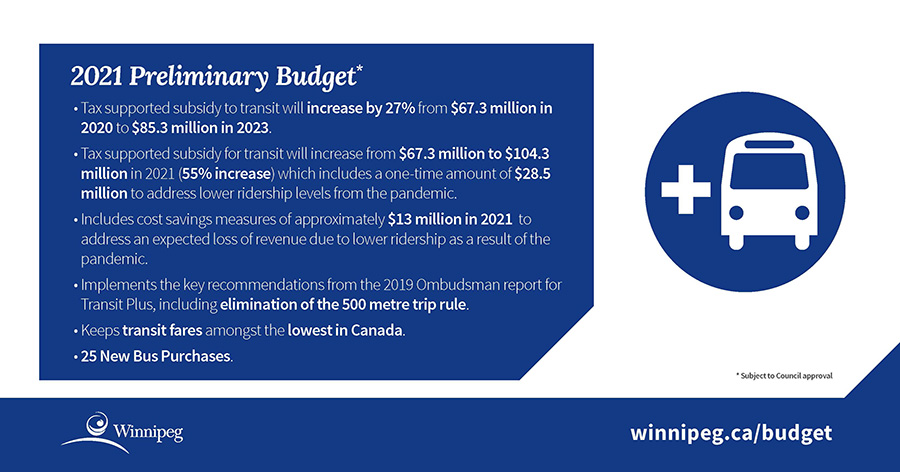
- Tax supported subsidy to transit will increase by 27% from $67.3 million in 2020 to $85.3 million in 2023.
- Tax supported subsidy for transit will increase from $67.3 million to $104.3 million in 2021 (55% increase) which includes a one-time amount of $28.5 million to address lower ridership levels from the pandemic.
- Includes cost savings measures of approximately $13 million in 2021 to address an expected loss of revenue due to lower ridership as a result of the pandemic.
- Implements the key recommendations from the 2019 Ombudsman report for Transit Plus, including elimination of the 500 metre trip rule.
- Keeps transit fares amongst the lowest in Canada.
- 25 New Bus Purchases.
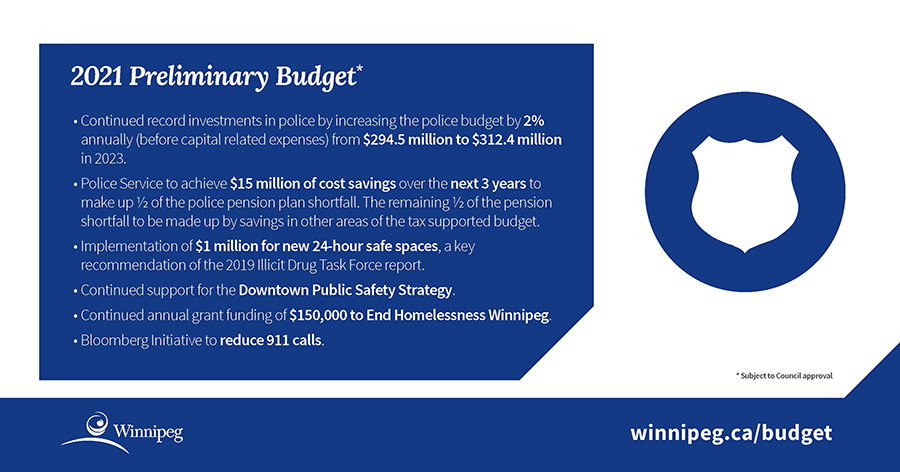
- Continued record investments in police by increasing the police budget by 2% annually (before capital related expenses) from $294.5 million to $312.4 million in 2023.
- Police Service to achieve $15 million of cost savings over the next 3 years to make up ½ of the police pension plan shortfall. The remaining ½ of the pension shortfall to be made up by savings in other areas of the tax supported budget.
- Implementation of $1 million for new 24-hour safe spaces, a key recommendation of the 2019 Illicit Drug Task Force report.
- Continued support for the Downtown Public Safety Strategy.
- Continued annual grant funding of $150,000 to End Homelessness Winnipeg.
- Bloomberg Initiative to reduce 911 calls.
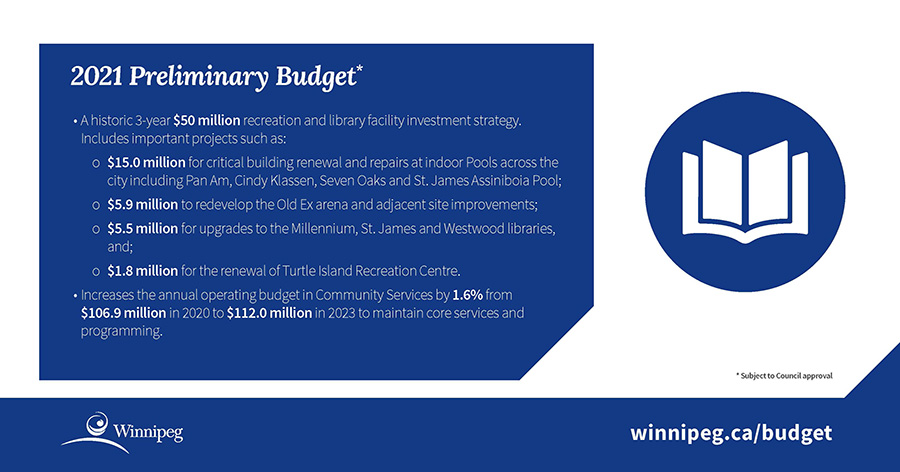
- A historic 3-year $50 million recreation and library facility investment strategy. Includes important projects such as:
- $15.0 million for critical building renewal and repairs at indoor Pools across the city including Pan Am, Cindy Klassen, Seven Oaks and St. James Assiniboia Pool;
- $5.9 million to redevelop the Old Ex arena and adjacent site improvements;
- $5.5 million for upgrades to the Millennium, St. James and Westwood libraries, and;
- $1.8 million for the renewal of Turtle Island Recreation Centre.
- Increases the annual operating budget in Community Services by 1.6% from $106.9 million in 2020 to $112.0 million in 2023 to maintain core services and programming.
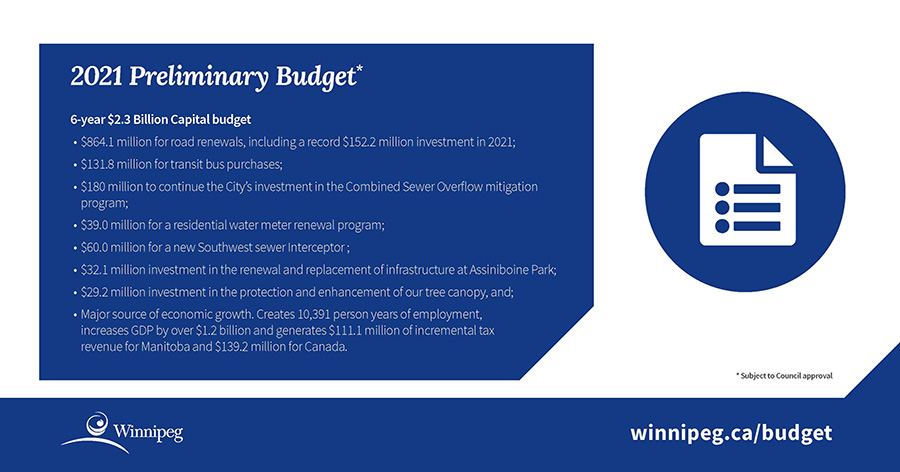
6-year $2.3 Billion Capital budget
- $864.1 million for road renewals, including a record $152.2 million investment in 2021;
- $131.8 million for transit bus purchases;
- $180 million to continue the City’s investment in the Combined Sewer Overflow mitigation program;
- $39.0 million for a residential water meter renewal program;
- $60.0 million for a new Southwest sewer Interceptor;
- $32.1 million investment in the renewal and replacement of infrastructure at Assiniboine Park;
- $29.2 million investment in the protection and enhancement of our tree canopy, and;
- Major source of economic growth. Creates 10,391 person years of employment, increases GDP by over $1.2 billion and generates $111.1 million of incremental tax revenue for Manitoba and $139.2 million for Canada.
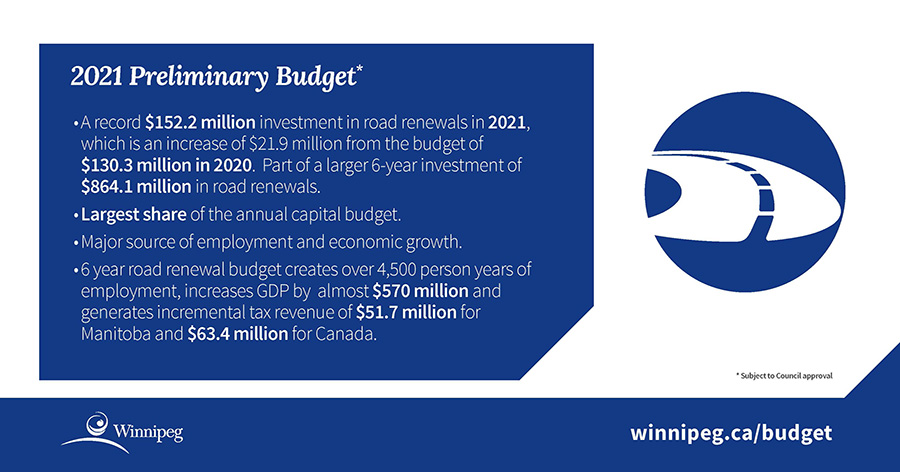
- A record $152.2 million investment in road renewals in 2021, which is an increase of $21.9 million from the budget of $130.3 million in 2020. Part of a larger 6-year investment of $864.1 million in road renewals.
- Largest share of the annual capital budget.
- Major source of employment and economic growth.
- 6 year road renewal budget creates over 4,500 person years of employment, increases GDP by almost $570 million and generates incremental tax revenue of $51.7 million for Manitoba and $63.4 million for Canada.
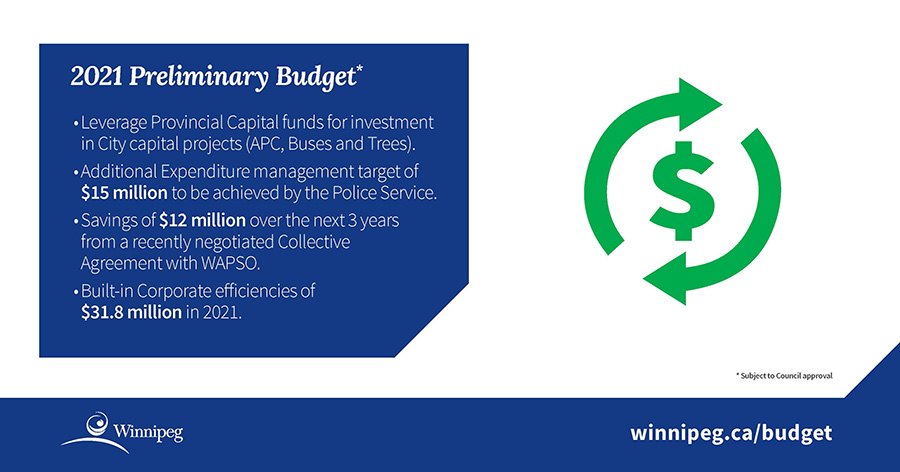
- Leverage Provincial Capital funds for investment in City capital projects (APC, Buses and Trees).
- Additional Expenditure management target of $15 million to be achieved by the Police Service.
- Savings of $12 million over the next 3 years from a recently negotiated Collective Agreement with WAPSO.
- Built-in Corporate efficiencies of $31.8 million in 2021.
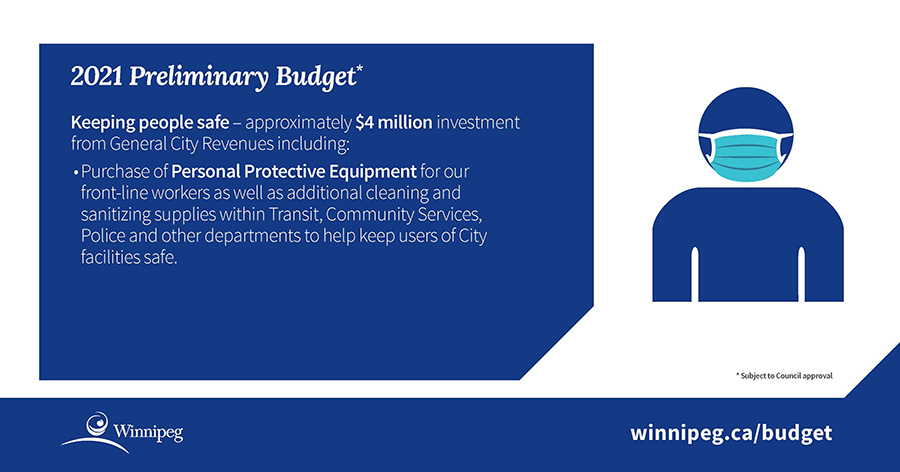
Keeping people safe – approximately $4 million investment from General City Revenues including:
- Purchase of Personal Protective Equipment for our front-line workers as well as additional cleaning and sanitizing supplies within Transit, Community Services, Police and other departments to help keep users of City facilities safe.
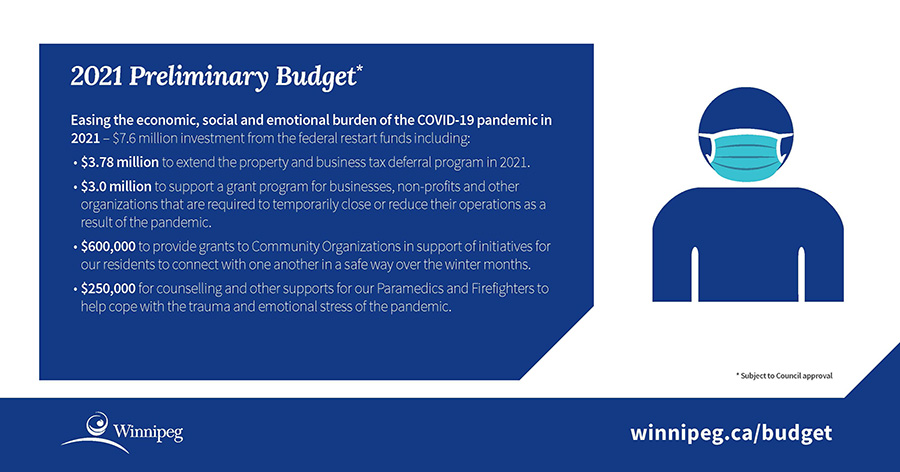
Easing the economic, social and emotional burden of the COVID-19 pandemic in 2021 – $7.6 million investment from the federal restart funds including:
- $3.78 million to extend the property and business tax deferral program in 2021.
- $3.0 million to support a grant program for businesses, non-profits and other organizations that are required to temporarily close or reduce their operations as a result of the pandemic.
- $600,000 to provide grants to Community Organizations in support of initiatives for our residents to connect with one another in a safe way over the winter months.
- $250,000 for counselling and other supports for our Paramedics and Firefighters to help cope with the trauma and emotional stress of the pandemic.
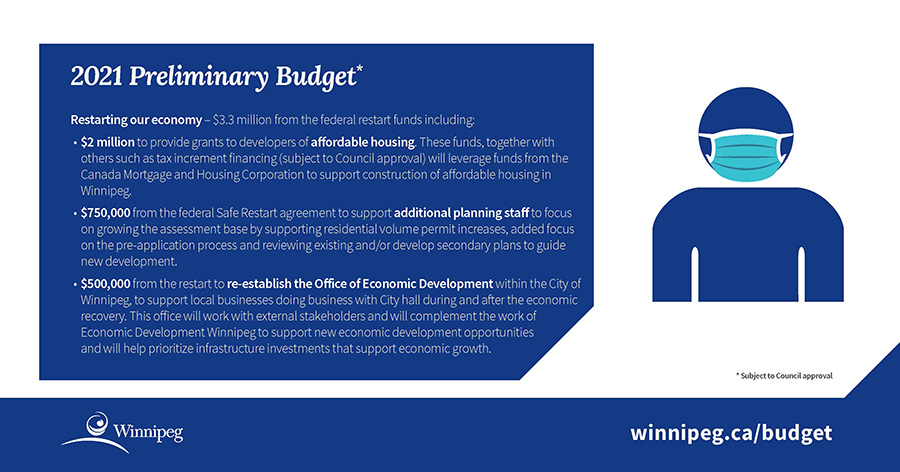
Restarting our economy – $3.3 million from the federal restart funds including:
- $2 million to provide grants to developers of affordable housing. These funds, together with others such as tax increment financing (subject to Council approval) will leverage funds from the Canada Mortgage and Housing Corporation to support construction of affordable housing in Winnipeg.
- $750,000 from the federal Safe Restart agreement to support additional planning staff to focus on growing the assessment base by supporting residential volume permit increases, added focus on the pre-application process and reviewing existing and/or develop secondary plans to guide new development.
- $500,000 from the restart to re-establish the Office of Economic Development within the City of Winnipeg, to support local businesses doing business with City hall during and after the economic recovery. This office will work with external stakeholders and will complement the work of Economic Development Winnipeg to support new economic development opportunities and will help prioritize infrastructure investments that support economic growth.
Budget news
- November 5, 2021 – City releases Financial Status and Forecast Report to September 30, 2021
- October 8, 2021 – City releases Financial Status and Forecast Report to August 31, 2021 and Economic Outlook for Fall 2021
- September 13, 2021 – City releases Financial Status and Forecast Report to June 30, 2021
- September 9, 2021 – Review Process for the 2022 Balanced Budget Update Initiated
- February 10, 2021 – City releases year-end Financial Status Report for 2020
- January 11, 2021 – City releases Financial Status and Forecast Report to November 30, 2020
- December 16, 2020 – Preliminary 2021 Balanced Budget Update Adopted by Winnipeg City Council
- December 10, 2020 – Preliminary 2021 Balanced Budget Update continues to prioritize new strategies for community safety
- December 8, 2020 – $1.25 Million to support economic development in preliminary 2021 Balanced Budget Update
- December 7, 2020 – Preliminary 2021 Balanced Budget Update puts a focus on affordable housing needs in Winnipeg
- December 4, 2020 – Historic $152.1 million investment into road renewals in 2021, and $864.1 million over the next six years
- December 4, 2020 – Despite significant losses due to the pandemic, significant support and innovation for Winnipeg Transit continues
- December 1, 2020 – Investments in Water and Waste help protect the environment while growing our city for the future
- November 27, 2020 – Almost 1,000 more businesses will no longer pay business taxes as part of the preliminary 2021 Balanced Budget Update
- November 27, 2020 – $3 Million COVID-19 Economic Support Grant Program will provide assistance to businesses and not-for-profit organizations
- November 27, 2020 – Capital investment plan will help power Winnipeg’s economy for the next six years
- November 27, 2020 – Significant investment into trees added to the preliminary 2021 Balanced Budget
- November 27, 2020 – City of Winnipeg preliminary 2021 Balanced Budget Update tabled at Executive Policy Committee
- October 9, 2020 – City asks for public feedback to update the multi-year budget
- September 17, 2020 – 2021 City of Winnipeg Budget Review Process Underway

